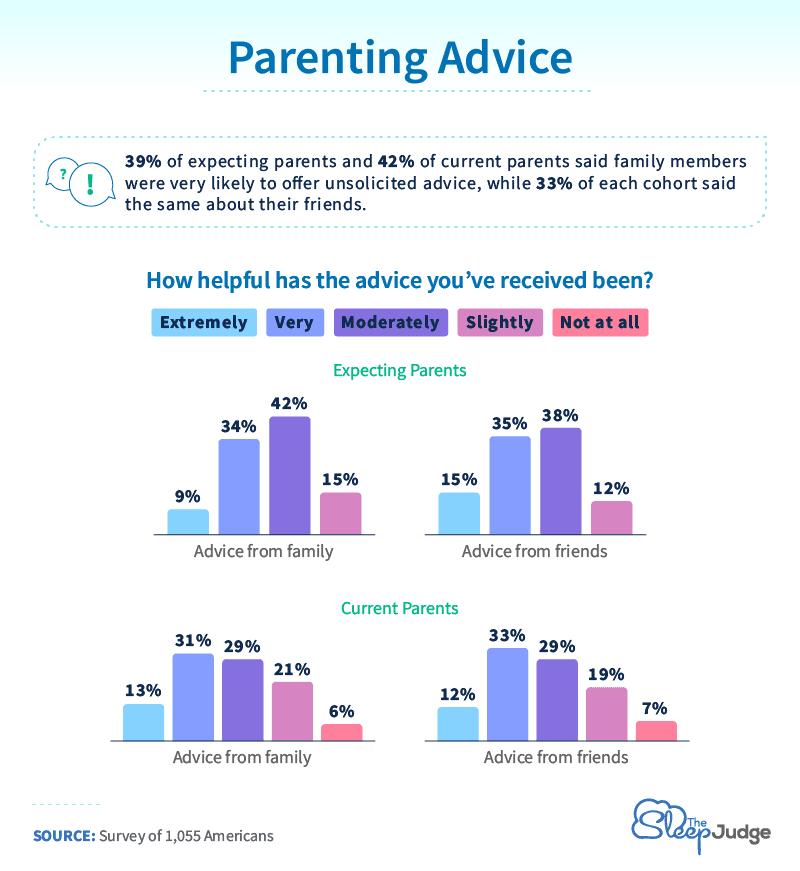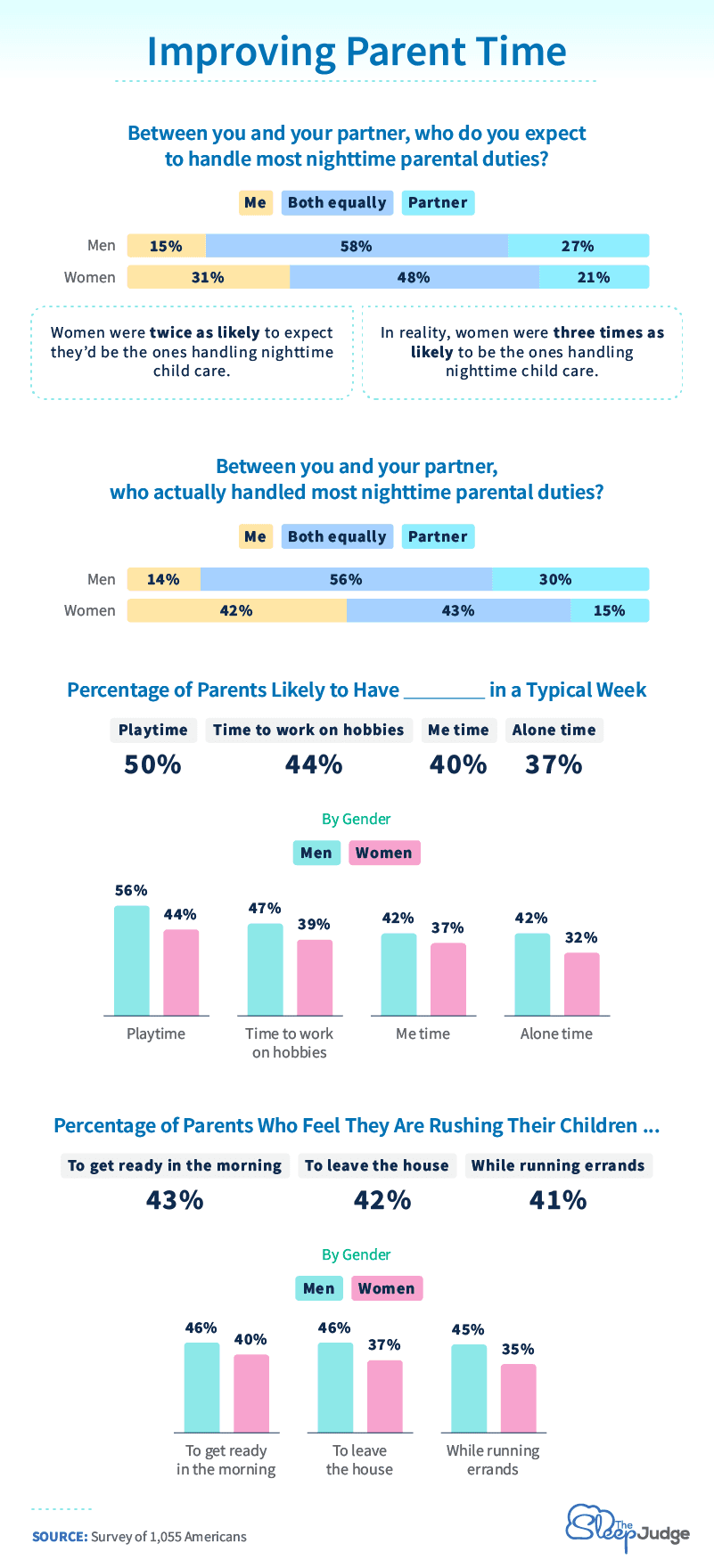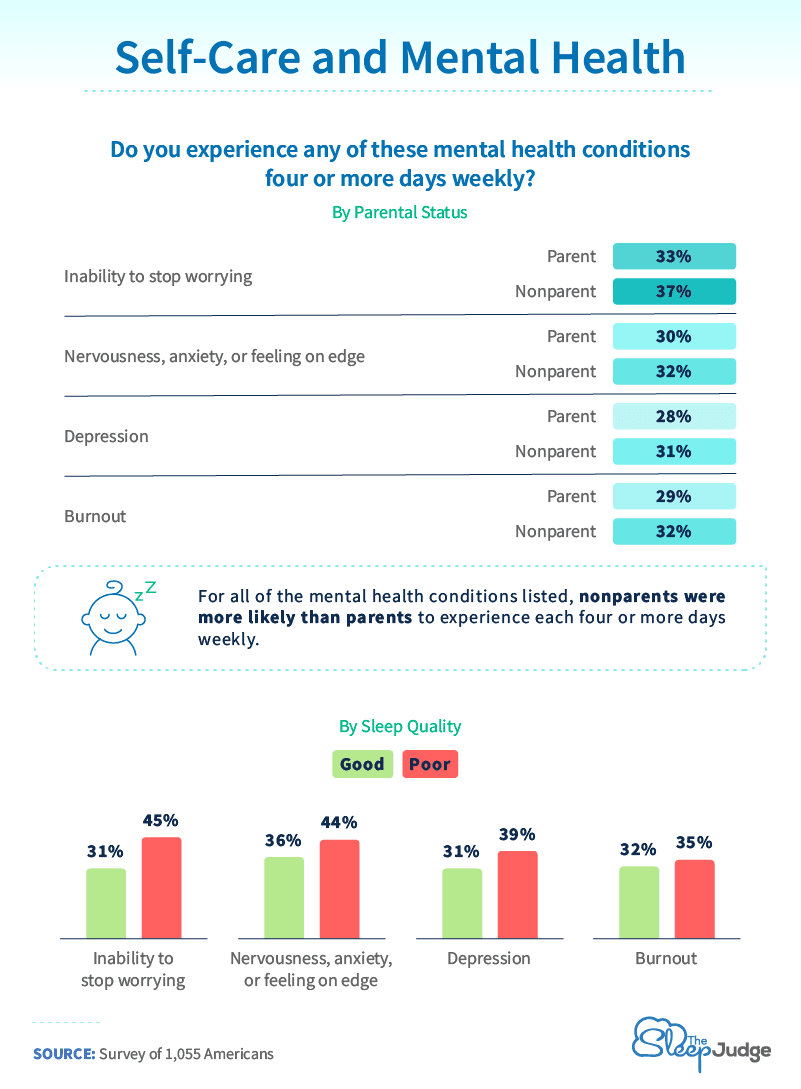Suburbanites get 8.4 hours less sleep a month than the average
As a parent-to-be, the first words you’ll hear out of most people’s mouth are “Sleep now while you still can!” Parents expect to get less sleep due to their tiny human screaming at all hours of the night. In fact, studies suggest that parents of newborns may only enjoy 1 to 3 hours of continuous sleep at a time. What other aspects of parenting impact sleep? Does the way in which parents share tasks play a role? We surveyed over 1,000 people in the U.S. to find out more about factors that could potentially play a role in the quality and quantity of sleep.
Key Takeaways
- Compared to the average seven hours of sleep per night, people with multiple children sleep 3.9 hours less per month, while people living in suburban areas sleep 8.4 hours less monthly.
- 56% of parents who read to their child before bedtime report high levels of sleep quality.
- 45% of people with poor sleep quality reported more than four days of anxiety a month.
To Sleep or Not to Sleep
A healthy night’s sleep ideally lands somewhere between seven and nine hours for adults. While one might expect parents to enjoy significantly fewer hours of snooze time, our research proves that this is not necessarily the case. Rather, both those with and without children reported a similar amount of nightly rest – approximately seven hours. However, a few other factors play into the amount of sleep people, specifically parents, tend to get. For example, the area in which respondents live – urban, suburban, small town, or rural – appeared to impact sleep. Our research shows that those residing in suburban and small-town locations, especially people with one or more children, experienced a slight dip in sleep hours compared to the average.
First, we dug into the consistency of respondents’ sleep schedules. Those with no children or only one child reported the most irregular sleep schedules, with 29% claiming to have no consistency at all. Conversely, those with two or more children reported the most consistency in their nightly slumber, with 44% reporting reliable schedules. Location also played a role. Forty-three percent of parents reported having no consistent sleep schedule, including 30% of those in rural areas. Overall, several aspects including location, generation, and income level seemed to impact sleep schedules for parents and nonparents alike.
Quality Over Quantity
While endless hours of sleep might sound like a dream, especially to new parents, the quality of the ZZZs you are catching is also important. Of those surveyed, the majority – 47% – would rate their sleep as good. This percentage increased dramatically to 76% among those with a very consistent sleep schedule.
How can parents achieve a more reliable sleep pattern? Fifty-six percent of expecting parents planned to implement strict bedtimes, while 53% were betting on bathing their child before bedtime to ensure the best sleep possible.
These potential strategies beg the question – which tactics genuinely work to improve sleep quality as a parent? More than half of current parents surveyed agreed that sleep training, or teaching your baby to fall asleep independently and sleep through the night, is an effective practice. Reading a book to little ones before bedtime was also popular, with 56% reporting this as a successful ritual. Enjoying high-quality sleep is vital for parents as they adjust to the demands and responsibilities of caring for a newborn.
Would You Like My Opinion?
Americans are especially fond of diverse methods of seeking insight into effective parenting, including podcasts and trendy classes. However, at any stage of parenting, it is almost a rite of passage to receive advice, albeit sometimes unsolicited, from those around you.
For those with a baby on the way, 42% reported that words of advice received from family were moderately helpful, while 38% said the same about tips from friends. Current parents were even more receptive to advice, proving most likely to label insights from friends and family alike as “very helpful.” As expected, those in both scenarios confirmed that family members were more likely to offer up unsolicited child care advice than friends.
Who Takes on More – Mom or Dad?
Recent generational shifts have resulted in more career-driven women and thus more demand for dads to help out at home. We wanted to know how this had impacted the allocation of parenting roles. Interestingly, 31% of women still expected to be the one crawling out of bed to tend to a fussy baby. In reality, women were even more likely to handle overnight duties, with 42% ending up in this role as opposed to 14% of men. This is despite the fact that most of the women we surveyed were employed either full or part time.
Men found more time to enjoy personal activities, including hobbies and time alone, than women. Perhaps this is explained by our male respondents also admitting that they were more likely than their female counterparts to rush their children through tasks such as the daily morning routine and running errands. Overall, even as the cultural shift toward more balanced parenting takes place, women continue to take on the majority of child care responsibilities.
Impact on Mental Health
Finally, our research addresses one of the most stigmatized issues of becoming a parent – maintaining one’s own mental health. As expected, those experiencing mental health struggles reported poorer quality sleep, with anxiety and the inability to stop worrying serving as the biggest culprits.
Does having a child increase the likelihood of mental health issues? Our research says no – those without children were slightly more likely to report struggling with various mental health conditions for four or more days per week. Sleep quality also correlates to mental health, with 44% of those who reported poor sleep experiencing more than four days of anxiety per week – in comparison to 36% of those who reported good sleep quality. For parents especially, taking care of personal mental health can leave a positive lasting impression on their children.
Factors Affecting Sleep
Our research shows that factors including the sharing of parental responsibilities, generational norms, and mental health issues can impact both quality and quantity of sleep. Further, this study highlights differences between new parents’ expectations and current parents’ realities. If you are an expecting parent, or plan to have children in the future, we hope this study helps you to discover potential options for both increasing the amount of sleep you get postpartum and improving its quality.
Regardless of if you have children or where you are living, your mattress and pillow can also impact your quality of sleep. Visit thesleepjudge.com to find unbiased bedding reviews so that you can get the best sleep possible.
Methodology
We surveyed 1,055 respondents; 583 identified as men, 469 identified as women, and three respondents identified as nonconforming. Additionally, 570 respondents did not have any children, 220 had one child, and 265 respondents had two or more children. Seventy respondents were pregnant or expecting a child.
When using survey data there are certain limitations with self-reporting, including by not limited to, telescoping, exaggeration, and selective memory. This data was not weighted nor were any hypotheses statistically tested. This is a purely exploratory study into the relationship between parents and sleep.
Fair Use Statement
If you have children yourself or interact with someone who does, we encourage you to share these insights as you see fit. Please just make sure to do so for noncommercial purposes only, and to link back to this article and thesleepjudge.com so future readers have access to all the information.





